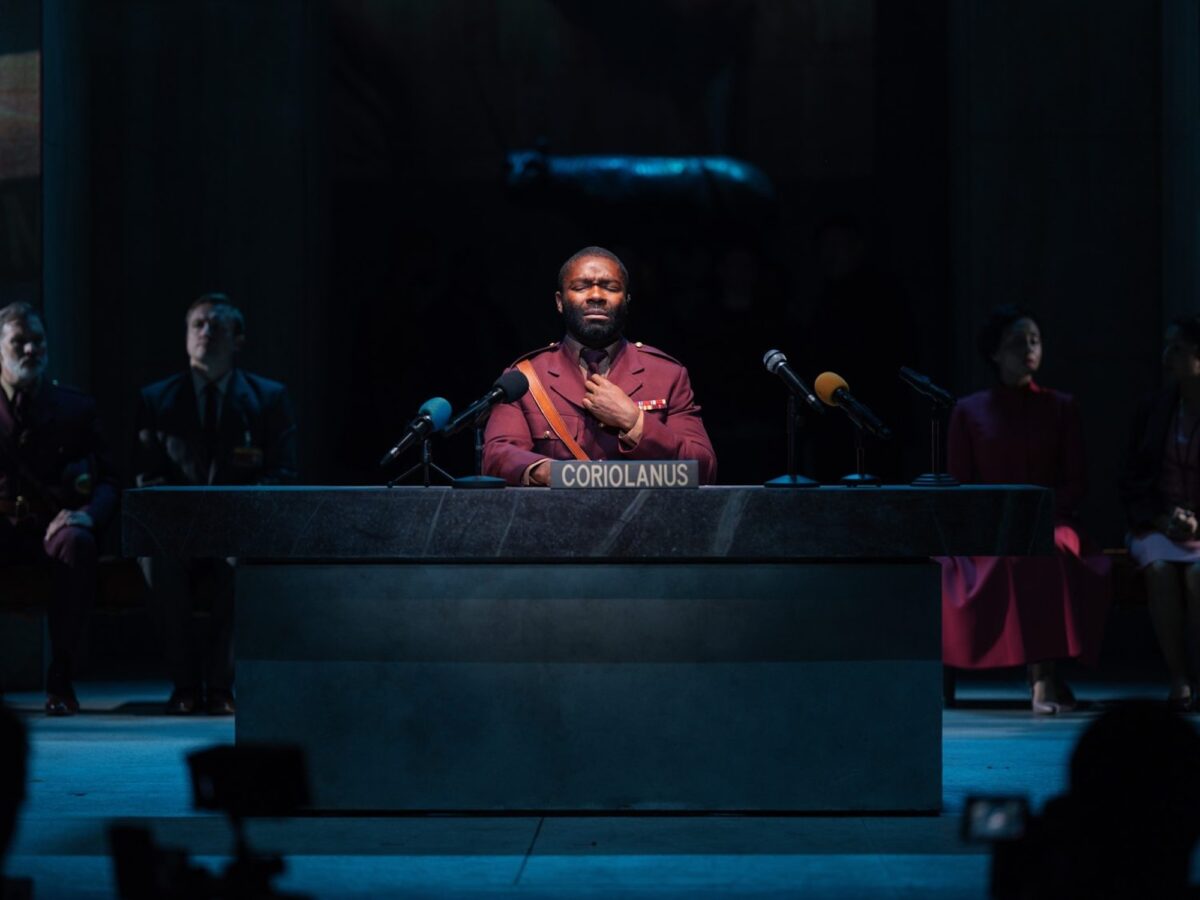
Coriolanus at the National Theatre is a breath-taking examination of masculinity, idealism, and how social fantasies weave drama into the fabric of political structures. The play itself is storied and needs little introduction – a Roman captain, Caius Marcius, falls from grace for playing the role of a soldier too well amidst his Machiavellian political adversaries, leading to death and tragedy – however, this latest adaptation shows a keen awareness of how stories shape our contemporary political landscape. Playing upon Shakespeare’s original text to draw attention toward the psychological complexity of its tragic protagonist, Lyndsey Turner’s response is rich, keenly dramatic, and intellectually salubrious. It may also hold the key to the populist politics of our times and the upcoming US election.
Though historically distant, the mechanisms of Roman politics, particularly its showmanship onstage, reflect a fascinating interlocking of narrative components that can be observed plainly in the politics and psychology of popular individuals in our present. However, to fully appreciate the dance of thought-processes on display, a brief map must be laid out.
Each character in Coriolanus, and its Roman society, is split. Envisioning a separate pair of cascading and generative reactions, not unlike those produced in John Conway’s ‘Game of Life’, in which self-sustaining interactions produce and iterate patterns in a computer program, Shakespeare’s players can be understood as comprised of two distinct processes of meaning: each with a distinct logic.
One is the political reality of their situation, the foundational gears and systems which allow the characters to exist: the necessity of bread for food, the fuel for Rome’s people, the need for power to be popular in order that its government can persist. These heavy, clunky operations that might well be made of stone, and they are difficult to change.
The second process is manifest through the stories that these people inhabit – the roles they believe themselves to play, the personalities they identify with, the virtues that they hold dear – which have few limiting factors within their own system. Hinging on the mutability of interpretation, how our material surroundings can be read in a multitude of ways, the value ascribed to certain behaviours, actions, and events is entirely dependent on how the individual chooses to see them. Conflict can be horrifying or glorious; it all depends on who’s holding the camera.
However, it’s crucial to remember that these ideas, the many lenses by which an individual constructs his story of the world, must come from somewhere. Anyone who’s sat through an undergraduate liberal arts lecture can ascribe about eight distinct, but not always contradictory, theories about where we interpolate our stories, how the process of fantasy comes into being. The vast majority of these, at least preceding any conscious reflection on behalf of the thinker in question, are manifest socially. Stories are carried from one generation to the next, between people, from adults to children, from parents to their offspring. Coriolanus is no different. Indeed, the great drama of the play is fired up by how its titular character is defined and redefined by others, including his mother.
The clunky mechanisms of Roman politics describe Coriolanus as a solider, as a conqueror on the state’s behalf, and by his successes a candidate for consulship – in modern terms, one half of a dual, and equally powered, presidency. Within the walls of a city constructed long before his time, he is presented with certain paths to walk.
But psychologically, Coriolanus is much more than this. In his own eyes, and in the eyes of his mother – not contemporaneously but, as he might have seen them, in the eyes of his perceived and constructed mother-figure – he is a hero. More than a soldier, he is a living embodiment of masculine and stately values. Often, other characters criticise him as egotistical, and prideful, but to ascribe his typical ‘fatal flaw’ to simple arrogance or exceptionalism would be a clumsy reduction of the real complexity on display, captured so startling by David Oyelowo’s performance.
Coriolanus, as he comes to be known, has been raised to fight selflessly. His successes on the battlefield, in given historical context, can only be read as testament to this alignment of a characteristically noble lack of ego with survival, triumph, and celebration. Nobility, as that which distinguishes Rome’s commoners from their heroes, is defined in measure of its success, and this shapes Coriolanus, long before the start of the play, into a man whom by his own success has been ascribed a higher moral value than his fellow citizens, one to be received by others as pride and which subsequently acts as the root of his downfall. In short, his tragedy is not due to pride itself, but his too-perfect embodiment of the fantasy of the model Roman citizen.
Rome, when it later burns, when it comes all too close to crumbling, does so at the hands of its most perfectly fantasised champion.
In this case, the imagined model citizen enters reality with a brilliant, almost Zizek-inflected irony. In his essay ‘Passions of the Real, Passions of Semblance’, Zizek makes a famous inversion of the typical Lacanian notion of a ‘real’ – unpredictable, not socially programmed / anticipated – event entering the symbolically constructed reality of an individual and shattering their preconceived, ideologically nourished map for understanding the world, claiming that political acts can present an event where a fantasised enemy invades and disrupts what we consider ordinary reality. A very similar notion fuels the dramatic tension of Coriolanus, both the play, and the man.
Believing whole-heartedly in his identity as Rome’s hero-warrior, Coriolanus is entirely unequipped to deal with the cold and cumbersome motions of actual Roman politics. He exists, both for his onlookers, admirers, and for himself, as a dream come to life. In essence, he is a Roman fairy-tale, that clashes with the bleak amoral political machinations that make up the daily operation of the state that he has idolised, and whose idolisation creates himself.
But the beauty, and tragedy, and psychological finery of the play and Lyndsey Turner’s production, lies in the ultimate nature of such dreams when they enter reality. They are, at least in this case, utterly destructive.
Turning our attention from the play to the politics of our world, the comparisons are ripe, though perhaps with a greater of irony. Political satire often works by turning the fantasy of political life in on itself, sprucing unlikely figures into humorous caricatures, by redoubling the eccentricity of a situation to pierce reality with its own fantasy, Zizek-style. Take David Foster Wallace’s novel ‘Infinite Jest’, in which the prospective President of a dystopian United States is characterised as obsessed with cleanliness, order, and sanitisation, making him the unlikely hero of a USA ripe with waste, overproduction, and ravenous consumerism. Ultimately, he sets into motion the events which lead into the novel’s dire situation, who tips the national equilibrium toward disrepair and dystopia. Likewise, it takes only a glance at the upcoming US 2024 Presidential Election to see the same dynamics at play.
In truth, what the American people will likely be voting for is neither practicality, nor immediate utility in the address of their concerns for their well-being, wages, and health. As Shakespeare elegantly foretold, as must all attempts at public office contend, they will be voting for their champion, their hero that best embodies fantasy values, constructed from their social fabric as from primordial soup, that once it coalesces into recognisable life will sow the seeds the maximum of phantasmal pleasure and yet possibly their own destruction. For America to survive each of its elections, its voters must exceed their own conception of American values – or at least the idea that these values can be embodied by any one person. In short, voters shouldn’t vote for the candidate they perceive to be ‘the best American’, because that individual would surely be the most destructive for the American psyche. Instead, they should vote not for their nation as it has been, not as they remember it, but for the possibility of something new.
It’s a story we’ve all heard before, in one form or another. Coriolanus, once again, is a play for our times.
Coriolanus, – 9th November Olivier Theatre,
National Theatre






